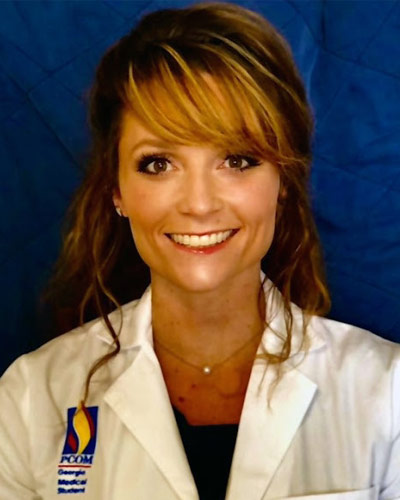End Stage Renal Disease Outcomes Research
Katie Bombly (DO '24)
February 1, 2022Osteopathic medicine student Katie Bombly (DO ‘24) holds a bachelor’s degree in nursing and a doctorate
of nursing practice from The University of North Florida.
 Prior to and throughout her medical education and training, Bombly has been involved
with research. She has worked alongside physicians as well as fellow medical school students to complete research projects that directly affect challenges in health
care.
Prior to and throughout her medical education and training, Bombly has been involved
with research. She has worked alongside physicians as well as fellow medical school students to complete research projects that directly affect challenges in health
care.
What do you study?
The research I am involved in seeks to investigate different outcomes in populations
affected by end-stage renal disease (ESRD) requiring hemodialysis (HD) in the Atlanta
area. The poster presented at the Southern Association of Vascular Surgeons Annual Meeting discussed treatment outcomes in the undocumented population who underwent arteriovenous
(AV) access creation requiring HD. Future investigations will be identifying how the
management of patients with ESRD can be improved.
What prompted you to pursue research?
As an aspiring vascular surgeon, I wanted to learn more about the common diseases
seen in this specialty to be able to provide exceptional care for my future patients.
I also believe that by participating in research, I have the opportunity to be a part of finding solutions to important healthcare
challenges including improving quality of life, creating equitable healthcare access
and identifying the best evidence-based treatment approaches.
What experience do you have conducting research?
Prior to medical school, I worked as a clinical research nurse with inpatient populations
conducting phase II and phase III clinical trials for a few years in Jacksonville,
Florida. Some of the studies I worked on utilized treatments for reducing the burden
of atherosclerotic plaques in coronary arteries, minimizing liver and kidney injury
during open-heart surgery and reducing the symptoms associated with acute heart failure.
While pursuing my Doctor of Nursing Practice (DNP), I completed my final project and
manuscript by studying the screening modalities and management of hepatitis C in patients
in underserved areas who could not afford health insurance.
At PCOM South Georgia, I have collaborated with other second-year medical students Samual Prahlow (DO ‘24),
Anthony Sciuva (DO ‘24) and Emily Wilson (DO ‘24) to evaluate the histopathologic
evidence of atherosclerosis in various arteries in cadavers from the Southeastern
United States. My classmates and I will present our findings as a poster at the International
Conference on Pathology in March 2022. Additionally, I am working with another classmate,
Alexandra Cain (DO ‘24), and a local general surgeon, Amber Holt, DO, evaluating perioperative
management of gastric outlet obstruction.
What are your responsibilities in this research project?
As a research intern, I work with a team from Emory University Medical School which
includes other medical students, vascular surgeons and vascular surgery fellows. In
collaboration with EUMS, the vascular surgery team treats patients at Grady Memorial
Hospital which allows access for myself and other research colleagues to screen and
collect data from their patients who underwent surgical AV access creation for HD.
Additionally, I am working with Christopher Ramos, MD, vascular surgeon and assistant
professor at EUMS on two projects: 1) comparing the patency of various AV access sites
to add to the existing body of knowledge related to HD access and 2) the role of perioperative
therapies on AV access outcomes.
What is the broader impact of your research?
ESRD is a chronic disease that has historically reduced life expectancy and has a
significant impact on not only patients and caregivers, but the healthcare system
as a whole. Our database has collected information that may identify barriers that
delay patient access to care, which leads us to finding possible solutions to improve
patients’ quality of life and reduce unnecessary hospital visits and procedures.
How does your research affect healthcare/health professions?
The improved management of patients with ESRD requiring hemodialysis (HD) also impacts
other healthcare professions commonly involved such as nephrologists, primary care
physicians, dialysis centers and emergency department members. Patients with ESRD
utilize these services often, sometimes a few times a week. With improved HD access
management, departments and team members are more efficiently used, and ideally, emergency
services are reduced.
About PCOM South Georgia
In 2019, Philadelphia College of Osteopathic Medicine (PCOM), a premier osteopathic
medical school established in 1899, extended its commitment to the Southeast by establishing
PCOM South Georgia. An additional teaching location in Moultrie, Georgia, PCOM South Georgia offers both
a full, four-year medical program leading to the Doctor of Osteopathic Medicine (DO)
degree and a Master of Science in Biomedical Sciences. PCOM is a private, not-for-profit
institution that trains professionals in the health and behavioral sciences fields.
Joining PCOM Georgia in Suwanee in helping to meet the healthcare needs of the state, PCOM South Georgia
focuses on educating physicians for the region. For more information, visit pcom.edu or call 229-668-3110.
Contact Us
For general media inquiries, please contact the Office of Marketing and Communications
at 215-871-6300 or communications@pcom.edu. Visit our media relations page to view contact information for public relations personnel.
Connect with PCOM South Georgia

 Prior to and throughout her medical education and training, Bombly has been involved
with research. She has worked alongside physicians as well as fellow
Prior to and throughout her medical education and training, Bombly has been involved
with research. She has worked alongside physicians as well as fellow 